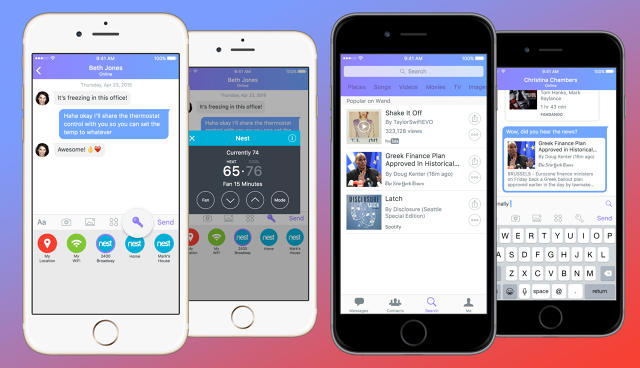Microsoft has announced it is acquiring natural language and AI messaging startup Wand Labs as part of a larger strategy to build out “conversation as a platform” (via TechCrunch).
Founded in 2013 by former Google staffer Vishal Sharma, Wand Labs’ stated aim is “to tear down app walls, integrate your services in chat, and make them work together so you can do more with less taps”.

Previously, Wand apps focused on using conversational interfaces to allow users to perform collaborative tasks, such as enabling a friend to control a Nest thermostat, for example. (All Wand apps have been removed from the App Store since the announcement.)
“I’m proud of the work my team has done and what we’ve already accomplished in this emerging space,” said Sharma in a statement on the Wand Labs website. “I’m delighted to be joining a company that shares our passion and enthusiasm for this new era where conversation is the central focus. Making experiences for customers more seamless by harnessing human language is a powerful vision and one that motivates me and my team.”
The terms of the buyout have not been disclosed, but the fledgling Silicon Valley startup has just seven employees – a world away from Microsoft’s recent $26.2 billion acquisition of LinkedIn, which has 9,700 full-time employees with offices in 30 cities around the world.
The two deals are likely related, however, as Microsoft appears to be maneuvering significant investment in the direction of conversational chat bot services backed by big data, natural language processing, and predictive analytics.
Wand employees are expected to be integrated into Microsoft’s Bing and Cortana teams, as the company follows a larger tech trend towards an era of conversational AI services and virtual messaging assistants.
Introducing chatbots into popular messaging apps are becoming more and more popular, with platforms like Kik and Skype gaining bot features to provide users with interactive chat logs that provide information on the weather, entertainment, or world news.
Facebook recently introduced chatbots to Messenger, and provided developers with toolkits to create third-party customer service chatbots and live chat APIs.
In the smart home sector, similar moves are aiming to make virtual assistants more intelligent at performing tasks and more responsive to specific queries, such as Amazon Echo’s recent “skills” upgrade, which enables its Alexa assistant to integrate with over 1,000 third-party apps.
Google recently announced its Echo rival, Home, while Apple is also <a href="http://rumored to be working on a similar, Siri-based device for the home.
Apple has reportedly been working on its rival device since before the Amazon Echo debuted in November 2014. Google Home will be available later this year, but it is not known when Apple will be ready to debut its home accessory or how it will fit into the company’s existing product lineup.
In a related move, Apple announced this week that it would open Siri up to third-party developers with a public API, allowing users to summon Apple’s personal assistant AI to access third-party services and apps hands-free, opening the door to a potential smart home assistant with enhanced functionality and contextual awareness.
In October 2015, Apple acquired VocalIQ, a UK-based startup that had spent the last 10 years researching natural language, belief tracking, decision making, and message generation, in an attempt to develop a next-generation natural language API.
It’s early days, but Apple may introduce the API in its Echo competitor because of its ability to go beyond the “session-based” contextual responses touted by the likes of Viv.
Discuss this article in our forums
Source: MAC ROUMORS
